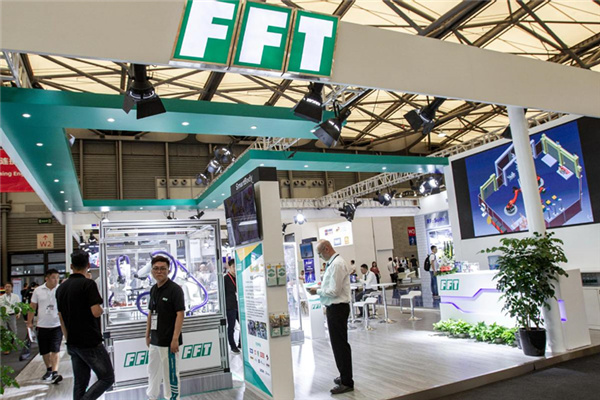Shanghai-based conglomerate Fosun International Ltd signed a strategic cooperation agreement on?Aug 22?with the local administration of Jiading district to advance the development of intelligent manufacturing and industrial automation in Jiading which is well-known for its automotive industry.
Fosun's subsidiary FFT Holding-the German industrial giant fully acquired by Fosun in May-will be responsible for the cooperation. The automotive industry, which contributed more than 72 percent of Jiading's GDP in 2018, will be the focus of the partnership, according to the agreement.
Jiading district and Fosun will also set up an emerging industry investment fund for intelligent manufacturers, which will mainly target the high-tech projects to be built in the district. According to Fosun's founder and chairman Guo Guangchang, FFT's China headquarters will be located in Jiading and its global headquarters will move here soon.
Zhang Xi, Party secretary of Jiading district, said that more than 300 carmakers and car parts manufacturers and another 100 automotive research and development companies have been registered in the district. Intelligent manufacturing, which is widely adopted in the automotive industry, will become the new economic driver of the district, he said.
Manfred Hahl, chief executive officer of FFT, said that the company will provide more intelligent, flexible and highly efficient production solutions for various industries by teaming up with Fosun. FFT will also increase its investment in research and development to fully explore the coordination between humans and automatic devices such as robots.
Established in central Germany's Fulda in 1974, FFT has been the strategic partner and core supplier for leading carmakers such as BMW, Daimler and Volkswagen, mainly providing turnkey solutions for the companies' complete projects. It also provides general assembly services to the Chinese domestically produced jumbo plane C919. Over the past few years, the company has extended its businesses to new energy vehicles' batteries, home appliances and industrial software.
According to Hahl, up to 19 percent of FFT's 850-million-euro ($944 million) annual turnover last year came from China. He expected the company's annual sales revenue to top 1.5 billion euros in the following years, with China becoming the largest earner for it.
Statistics from the Shanghai Municipal Commission of Economy and Informatization showed that Shanghai accounts for 42 percent of China's annual production volume of robots. According to the commission's director Wu Jincheng, Shanghai should grow into a benchmark of China's high-end manufacturing industry. Therefore, the commission released an action plan for Shanghai's intelligent manufacturing industry in early July, which specified that the total value of the intelligent manufacturing industry will exceed 130 billion yuan ($18 billion) by 2021.
"Germany takes the lead in terms of the development of smart factories, industrial standards and talents training. Deepened cooperation between the Chinese and German companies in these aspects should be encouraged," said Wu.
 |
|
The booth of FFT Holding during an exposition in Shanghai. [Photo by Lyu Liang/For China Daily] |

